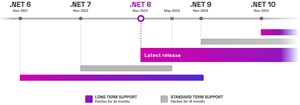News
First .NET 9 Preview Emphasizes Cloud-Native Development, AI Apps
"Our most important focus areas are cloud-native and intelligent app development," said Microsoft in outlining its vision for .NET 9, which this month shipped in its first preview ahead of reaching general availability in November.
While those are the primary areas of work, "You can expect significant investments in performance, productivity, and security, as well as advancements across the platform," the company said in a blog post earlier this month.
 [Click on image for larger view.] .NET Schedule (source: Microsoft).
[Click on image for larger view.] .NET Schedule (source: Microsoft).
Cloud-Native Development
Priorities haven't change much as cloud-native development was also mentioned in the first heading in Microsoft's .NET 8 announcement posted just about a year ago, wherein the company actually defined the term:
Cloud native is a term used to describe the architecture and design of applications that are built specifically for deployment in cloud computing environments. The main idea behind cloud native is to take advantage of the benefits provided by cloud computing platforms, such as scalability, elasticity, and self-healing, to create highly scalable and resilient applications. This allows flexibility and avoids potential over-investing in hardware and software to support growth. Many developers associate cloud native with concepts such as microservices, container orchestration (Kubernetes) and "-as-a-service "offerings.
In updating the .NET 9 platform for cloud-native developers, Microsoft said the team will continue years-long efforts to build out strong cloud-native fundamental tech in areas such as runtime performance and application monitoring. In the tools department, meanwhile, the company said its Visual Studio partners are planning improvements to support and augment the platform with tech associated with Native AOT, .NET Aspire and Azure deployment.
.NET Aspire ("an opinionated, cloud-ready stack for building observable, production ready, distributed applications") figures prominently in the dev team's cloud-native plans for .NET 9, as the Microsoft offering is said to significantly reduce the cost and complexity of building cloud applications and the distance between development and production.
"Visual Studio and Visual Studio Code will include new development and deployment experiences for .NET Aspire," Microsoft said. "This will include configuring components, debugging (including hot-reload) the AppHost and child processes, and fully integrating with the developer dashboard. Developers will be able to deploy their projects to Azure Container Apps, from Visual Studio, Visual Studio Code, and with Azure Developer CLI (azd)."
Native AOT will also be addressed, as the team plans to make it accessible to more developers, improving on the current scheme in which "Native AOT code compilation requires installing and using tools that many .NET developers do not commonly use." Those tools, depending on the scenario, might include Docker and/or Windows Subsystem for Linux 2 (WSL2), for one example.
Intelligent App Development
"Developers will find great libraries and documentation for working with OpenAI and OSS models (hosted and local), and we'll continue collaborating on Semantic Kernel, OpenAI, and Azure SDK to ensure that .NET developers have a first-class experience building intelligent applications," Microsoft said.
One bit of work will update the ChatGPT + Enterprise Data with Azure OpenAI and Cognitive Search .NET Sample on GitHub throughout the release.
.NET MAUI, ASP.NET Core, Containers and More
Microsoft published announcements about several other .NET 9 components, including .NET Multi-platform App UI (MAUI), ASP.NET Core, containers and more.
They can be found on the GitHub platform, which Microsoft is now using more for development tooling announcements rather than its DevBlogs site. Specifically, on the Preview 1 GitHub release notes are links to:
More information can also be found in the "What's new in .NET 9" documentation.
About the Author
David Ramel is an editor and writer at Converge 360.